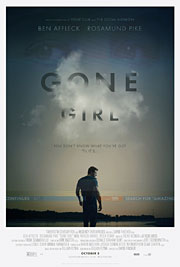
It’s tough to take a ‘holy shit’ book and make a ‘holy shit’ movie out of it, especially one with an unconventional narrative structure like Gillian Flynn’s “Gone Girl” (two points of view, two timelines). Challenge accepted, says David Fincher (yes, that casting in-joke was intentional), and thank God for that, because it’s hard to imagine anyone else capturing the essence of “Gone Girl” quite like he does. It doesn’t plumb the depths of the two lead characters’ minds as well as the book does, but how could it? Flynn’s novel was a master class analysis of psychopathology; to get the full effect on film, it would have had a runtime of over three hours, which would have been borderline unbearable. Peeling back fewer layers for the sake of an already lengthy runtime is the smart play here. If the movie makes any mistake, it’s with the handling of the third act, which had the potential to make for an even bigger ‘holy shit’ moment than the one that the movie already has.
Midwesterner Nick Dunne (Ben Affleck) moves to New York to be a writer, where he meets and marries Amy Elliott (Rosamund Pike), a NYC born and bred trust fund princess courtesy of a best-selling children’s book series that her parents have written about her (“Amazing Amy”). The recession of the late ‘00s is hard on the creative class, and both struggle to find work. When Nick’s mom becomes ill, the two move back to Nick’s Missouri hometown to take care of her. As their financial situation grows direr, Nick and Amy’s relationship is strained to the breaking point. On their fifth wedding anniversary, Amy disappears, and the circumstantial evidence suggests that Nick is involved in her disappearance and/or murder. And we should probably stop there.
I was originally opposed to the casting of the leads, but once again, Fincher and his casting director show that they know better. Affleck and Pike deliver rock-solid (and stone-cold) performances here as Nick, a bright guy who knows that Amy makes him a better person while resenting her for the ways that she changes him, while Amy who, well, it’s best not to say anything about Amy. This is arguably the best work Affleck has ever done, and the same can be said for Tyler Perry, who plays his high-profile lawyer Tanner Bolt. Carrie Coon’s stock is also about to rise thanks to her deft turn as Nick’s sardonic twin sister Margo, but it’s Kim Dickens’ performance as Detective Rhonda Boney that anchors the movie. She knows the case stinks to high heaven, but she also knows that it stinks in a different way than they usually do.
So, that third act: it’s out of sequence. Well, technically, it’s perfectly in sequence, but had they restructured things a little (i.e., show us the end, then flash back to how things happened), it would have been explosive. You would think Fincher of all people would sense the possibilities within his grasp. That he chose the more linear – and therefore, less interesting – route is, frankly, shocking. Lastly, we would be remiss if we didn’t mention the score that Trent Reznor and Atticus Ross (they wrote the Oscar-winning score for Fincher’s “The Social Network”) assembled here. It is unnerving, and odd, and perfect.
Hundreds of young couples will probably break up after seeing “Gone Girl.” It challenges traditional notions of marriage and relationships, and what one should actually expect from their partner, but it does so through a warped lens. Does that make the story’s more radical points of view any less valid? That is for the reader/viewer to decide. It will make for great conversation during dinner or drinks afterwards, but if your relationship is even remotely “complicated” (there’s a great joke about that word in the movie), you’d be wise to choose your words carefully, if you don’t want to walk home wearing a martini.
Related Posts
Posted in: Entertainment, Movie Reviews, Movies
Tags: Ben Affleck, David Fincher, Gone Girl, Gone Girl review, Rosamund Pike
















